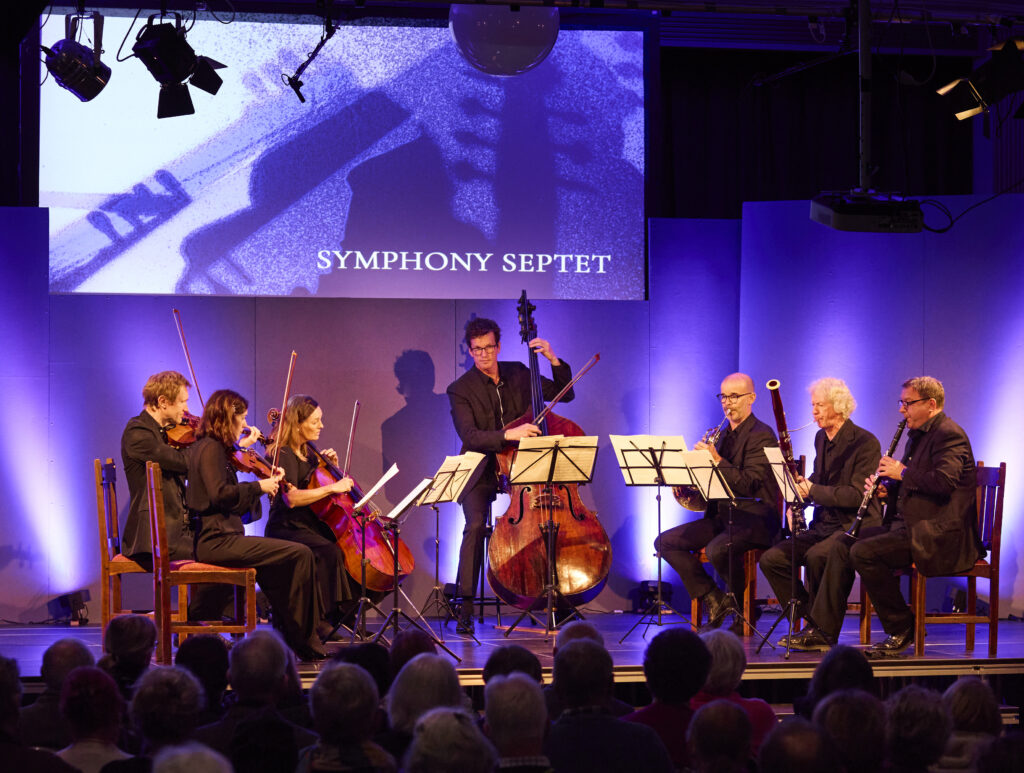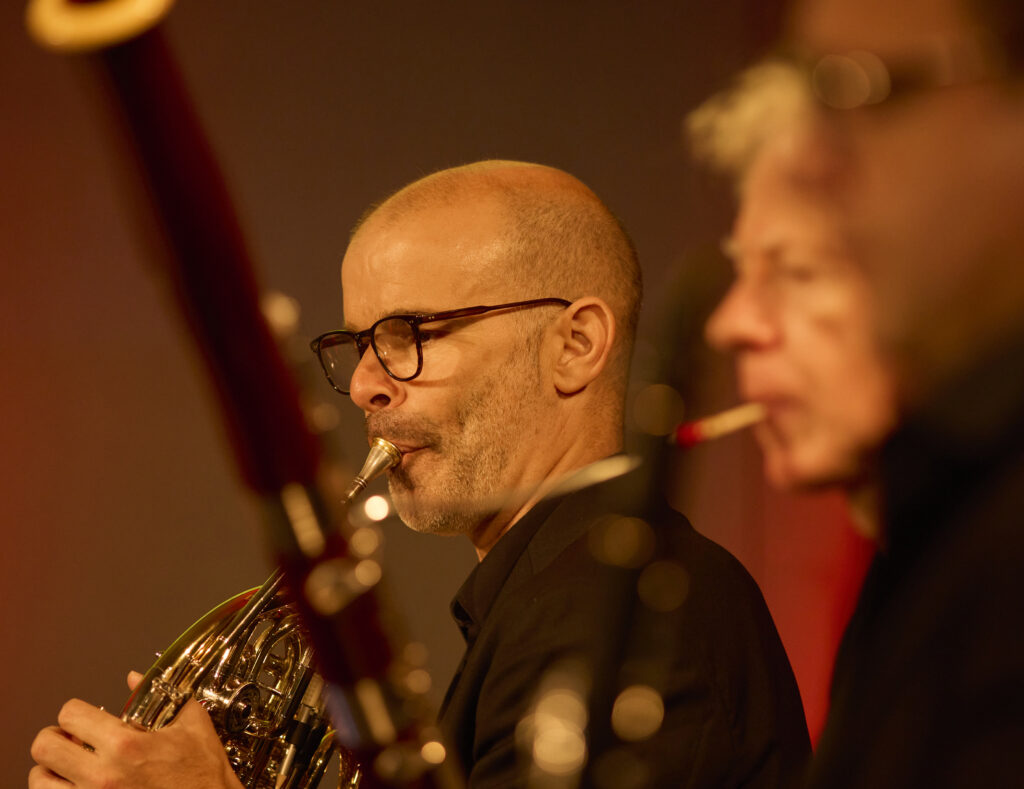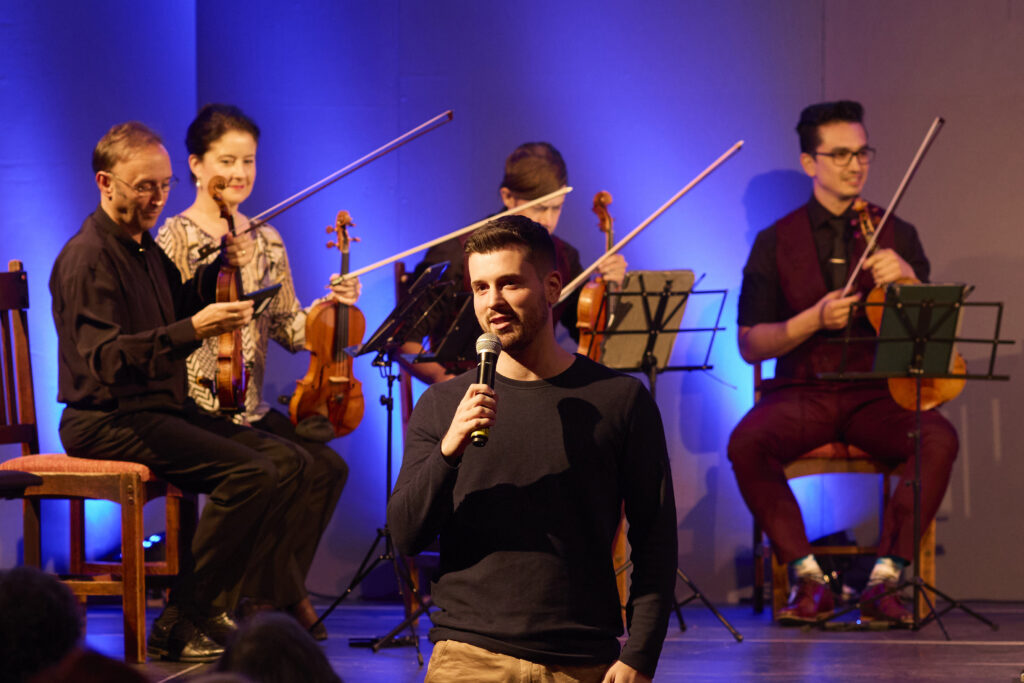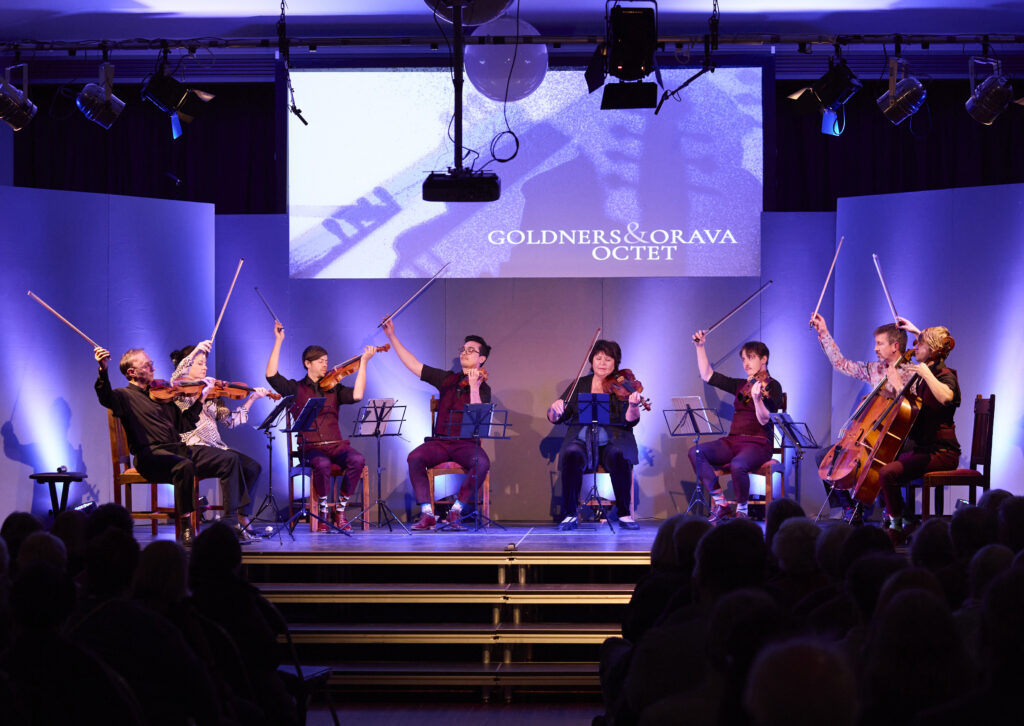As the 2024 Blackheath Chamber Music Festival comes to a close, one must reflect on the extraordinary achievements of its curator and director, Catherine Harker, who together with her team of dedicated volunteers has succeeded in creating a mainstay of Australia’s annual chamber music calendar.
With a growing audience year on year, this year’s festival played to near-capacity audiences with several concerts sold out.
An impressive lineup of virtuoso artists included John Bell with Tobias Brieder, former SSO Principal Harp Louise Johnson, Elena Kats-Chernin and Tamara-Anna Cislowska, international guests Pietro Locatto and Martina Biondi, and Ensemble Offspring with Eliza Shephard.
This year’s Quartet-in-Residence, Orava Quartet, also joined forces with retiring festival favourite, the Goldner String Quartet, but not before the principal players of the Sydney Symphony Orchestra returned to the stage of the Phillips Hall with a program of Berwald and Beethoven.
Both performances are reviewed separately below.

Symphony Septet at the Blackheath Chamber Music Festival 2024. Photo © Keith Saunders
SSO Principal Players: Symphony Septet ★★★★½
A highlight of last year’s festival, the Principal Players of the Sydney Symphony Orchestra return to perform septets by Berwald and Beethoven.
Scored for violin (Lerida Delbridge), viola (Justin Williams), cello (Catherine Hewgill), bass (Kees Boersma), clarinet (Francesco Celata), bassoon (Matthew Wilkie) and horn (Euan Harvey), both works highlight the virtuosity within the ranks of SSO, filling Blackheath’s Phillips Hall with a sound that at times equals that of a full orchestra.
The program opens with Berwald’s Grand Septet in B-flat. Last performed at the festival by the Australian Romantic & Classical Orchestra in 2021, it makes a welcome return as it gallops along, infused with glorious folk tunes.
Surprisingly, Berwald is frequently overlooked; even more surprisingly, he made his living as an orthopaedist before managing a sawmill and later a glass factory.
The first movement opens with delightful pizzicato, like raindrops falling from the leaves as the sun comes out after a storm.
Delbridge and Celata trade places as the lead voice, their finely honed technique releasing a fine burnished tone from her violin and a warm glow from his clarinet.
Both seem to capture the sounds of wildlife curiously peering through the foliage or scuttling away across a field.
Berwald was Swedish, but it is Albert Bierstadt’s painting Sierra Nevada Morning with its deer by the water’s edge that springs to mind, its balminess and tawny colours precisely what the SSO players evoke.

Symphony Septet at the Blackheath Chamber Music Festival 2024. Photo © Keith Saunders
The second movement of this septet-cum-tone poem features more of Celata’s beautiful clarinet, with Harvey adding a welcome ‘Wagnerian’ touch to the proceedings while the strings push things along and Boersma keeps time.
One can’t help but sense that this was the inspiration for Ken Howard, Geoffrey Burgon and Dudley Simpson’s scores for television which filled our living rooms in the 1970s and 80s. Perhaps this is the reason behind the players’ and audiences’ affinity for the piece.
As we progress through the third and final movement, each instrument has its moment to shine before a final flourish that sees the audience joyously bobbing along.
Beethoven composed his Septet in E-flat major nearly three decades before Berwald wrote his, so perhaps it would have been wiser to open with that.
Beethoven’s efforts here lack the thrills and spills of Berwald’s joyride, though this is in no way a reflection on the performances of the SSO principals. No fear there.
It is, of course a delightful piece, however after such a stunning rendition of the previous work, it does feel a little deflated.
One would feel ashamed to write this, were it not for the fact that Beethoven himself disliked the septet, which had become overplayed in his lifetime (the program notes even refer to it as “classical elevator music”). On one occasion, Beethoven even suggested it should be burned.
Nevertheless, it does provide Hewgill with a glorious solo in the Scherzo: Allegro molto e vivace and a superb cadenza in its final moments for Delbridge.
Free of the confines of the SSO podium, it is lovely to see these talented players’ personalities take hold, and Delbridge’s Louboutin pump kicking the air.

Harry Sdraulig with the Goldner String Quartet and Orava Quartet at the Blackheath Chamber Music Festival 2024. Photo © Keith Saunders
Goldner String Quartet & Orava Quartet: A Glorious Octet ★★★★★
The Blackheath Chamber Music Festival ends as it began, with the audience on its feet as it bids farewell to the Goldner String Quartet.
Audiences around the country still have an opportunity to catch this extraordinary ensemble before it disbands at the end of this year, however, for the Blackheath audience, this was it.
And what a performance to go out with, joined as they are by the Orava Quartet, the festival’s quartet-in-residence.
The concert opens with Harry Sdraulig’s Octet For Strings, commissioned for Musica Viva Australia by Geoff Stearn and premiered by the Goldners and the Orava Quartet during the 2018 Huntington Estate Music Festival. It is an apt choice for their final reunion, and Sdraulig is on hand to introduce the work.
Comprising a magnificent single movement, it opens with the work’s leitmotif before a dark and lamenting viola solo from the Goldner’s Irina Morozova.
This then leads to some fine layering by Sdraulig before a frenzied passage which begins much like Rimsky-Korsakov’s Flight of the Bumblebee.
After some beautifully executed transitions between various configurations of the two quartets, including virtuosic solos, impassioned ensemble moments and meditative moments of total respite, the work builds to a rhythmic climax that sets the tone for the rest of the evening.

The Goldner String Quartet and Orava Quartet at the Blackheath Chamber Music Festival 2024. Photo © Keith Saunders
What follows is simply stupendous.
There’s little that needs to be said about Mendelssohn’s Octet in E-flat major, except that it provides for a rapid-fire showcase of perhaps the finest string players in Australia at present.
If the SSO players had us bobbing up and down during the Berwald, the Goldners and the Orava Quartet had us rocking in our seats (at times violently) before we leapt to our feet with a cheer that must have echoed all the way to Govetts Leap and the Grose Valley.
What does need to be noted, however, is the camaraderie between the Goldners, now retiring after 30 years, and the Orava Quartet, founded in 2007.
And while the Orava Quartet ranks among the best in the world and was the first Australian string quartet signed to Deutsche Grammophon, it is heartwarming to see the reverence they show to the Goldners and to its violinist Dene Olding, who leads the combined quartets in this concert.
Having witnessed the Goldner String Quartet’s final appearance at the Blackheath Chamber Music Festival, it is safe to say its legacy is in very safe hands.












Comments
Log in to join the conversation.